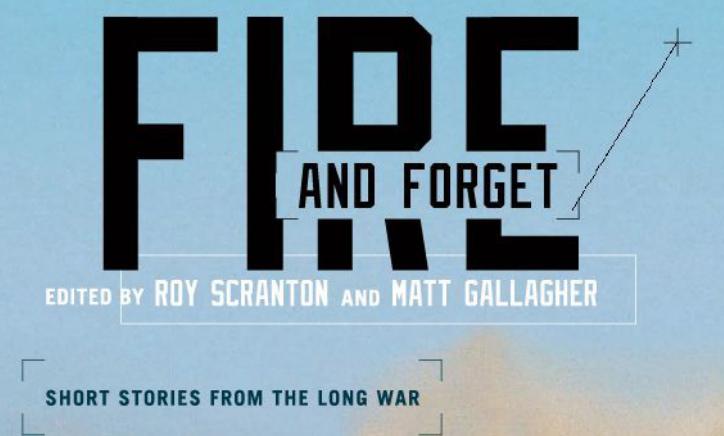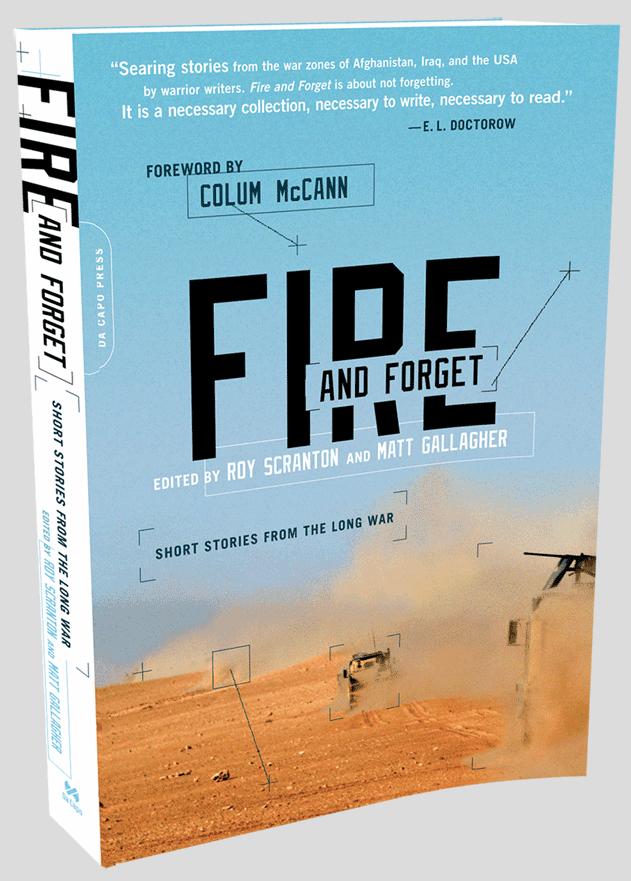Fire and Forget is an absolutely terrific collection of stories by fifteen exciting new writers, all products of the recent and current wars in Iraq and Afghanistan.
Fully a third of the writers have already published their own books. Siobhan Fallon’s book of connected stories, YOU KNOW WHEN THE MEN ARE GONE, has already garnered much deserved critical acclaim. Her story, “Tips for a Smooth Transition” adds a valuable chapter to her earlier oeuvre of the unavoidable miscommunication, disconnect, and struggles with loneliness and infidelity that occur between absent or returning soldiers and their spouses, left behind either alone or with small children.
It’s hard to pick a favorite entry here, but I loved Phil Klay’s “Redeployment,” maybe because of its dialogue of authentic GI language filled with all its political incorrectness which nevertheless brought guilty guffaws from me as I read it. I’d offer an example, but it’s too filthy for most of my review venues. And yet the same story, with the narrator’s fear of public places and the dilemma of dealing with a dying and beloved dog made me wince in empathy. Jacob Siegel’s “Smile, There Are IEDs Everywhere” shows three veterans of widely divergent backgrounds reuniting in New York City for a drunken binge. The difficulties of that “smooth transition” are glaringly displayed in the course of that evening.
In “Play the Game” Colby Buzzell (author of the memoir, MY WAR: KILLING TIME IN IRAQ) offers a chilling portrait of a futureless veteran who is probably suffering from PTSD, living in a transient LA hotel, drifting aimlessly between dead end jobs. Roman Skaskiw’s “Television” presents a well-meaning but naive young lieutenant who has yet to learn that war is about more than just the killing portrayed in video games.
Gavin Ford Kovite’s story, “When Engaging Targets, Remember,” gives us a thinking, college-educated soldier who fears he may think too long about the Rules of Engagement he has been given, thus endangering his own life and those of his fellow combatants. Then there is “The Train,” Mariette Kalinowski’s story of a female vet who obsessively rides the subways after having watched her best friend killed in front of her by a suicide bomber. Who says there are no women in combat?
“New Me” by Andrew Slater, and Brian Van Reet’s “Big Two-Hearted Hunting Creek” both deal with veterans who have been mutilated, traumatized and damaged who are trying to find their places in an apathetic civilian society. “Roll Call,” by David Abrams (author of the novel, FOBBIT), is the shortest and yet perhaps one of the most affecting of all the stories in the collection because of its subject: a unit memorial service for a fallen comrade. Like Phil Klay, Abrams has mastered the obscene, often hilarious, jargon of the enlisted man. Perry O’Brien’s “Poughkeepsie” gives us the poignant plight of a lonely soldier who has gone AWOL to find a pen-pal who, he learns too late, wants nothing to do with him.
Ted Janis’s “Raid” shows most effectively how too many combat tours can burn a man out, while Brian Turner (author of the poetry collection, HERE, BULLET) offers a dream-like look at a patrol lost in seemingly endless desert dunes in “The Wave that Takes Them Under.”
The final two pieces in the book are by its two main editors. Matt Gallagher (author of the memoir, KABOOM), in “And Bugs Don’t Bleed” paints an effective mini-portrait of a burned-out, deeply damaged vet, faithless women and greedy, predatory civilians who claim to support the troops. But as one character says, those troops “have been completely abandoned by the rest of the country.” Roy Scranton’s “Red Steel India” (an excerpt from his as yet unpublished novel, WAR PORN) shows the boredom and monotony of perimeter guard duty and the distrust and petty cruelties the soldiers show toward their Iraqi counterparts. (The tone of Scranton’s story brought to mind Joydeep Roy-Bhattacharya’s fine novel of the Afghanistan war, THE WATCH.)
I know I can’t even begin to do justice to the excellence and variety of the veterans’ experiences brought together between the covers of FIRE AND FORGET. So I’ll just say this. There is not a clinker in the bunch. Every story deserves its place in this landmark collection. I will remember these names and will be watching for them.
Fire and Forget: Short Stories from the Long War(edition 2013), edited by Roy Scranton and Matt Gallagher




Write a Letter to the Editor on this Article
We encourage readers to offer their point of view on this article by submitting the following form. Editing is sometimes necessary and is done at the discretion of the editorial staff.